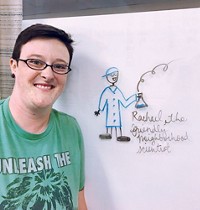Advertisement
Grab your lab coat. Let's get started
Welcome!
Welcome!
Create an account below to get 6 C&EN articles per month, receive newsletters and more - all free.
It seems this is your first time logging in online. Please enter the following information to continue.
As an ACS member you automatically get access to this site. All we need is few more details to create your reading experience.
Not you? Sign in with a different account.
Not you? Sign in with a different account.
ERROR 1
ERROR 1
ERROR 2
ERROR 2
ERROR 2
ERROR 2
ERROR 2
Password and Confirm password must match.
If you have an ACS member number, please enter it here so we can link this account to your membership. (optional)
ERROR 2
ACS values your privacy. By submitting your information, you are gaining access to C&EN and subscribing to our weekly newsletter. We use the information you provide to make your reading experience better, and we will never sell your data to third party members.
Careers
Three Little Words
by William F. Carroll, ACS Immediate Past-President
July 10, 2006
| A version of this story appeared in
Volume 84, Issue 28
During my tenure in the presidential succession, members constantly told me of their concern for the way the public perceives chemistry and perhaps even more important, how students perceive chemistry. I have heard them say, "Students don't go into chemistry because it's hard; they would rather do something easy." Or, "Students don't become chemistry majors because there are no jobs in chemistry, and they can make more money in law or business."
We all have anecdotes; but for the first time, I've seen a study that has helped me understand why students do go into the sciences. Robert H. Tai and coworkers at the University of Virginia tested whether eighth-grade students who saw themselves in a science-related career by age 30 actually obtained baccalaureate degrees in science at higher rates than those who did not want such a career (Science 2006, 312, 1143).
The hypothesis was tested for both life sciences and physical sciences, and was also tested against math achievement test scores. To summarize Tai's results, for the life sciences, eighth-grade math achievement score is not a reliable predictor of obtaining a science degree-but the expectation of working in the area is.
For the physical sciences, the result was a bit different. In this case, high math achievement score is a predictor of degree success in the physical and engineering sciences. But an even more solid predictor is career expectation, and it's not even close.
The authors note: "An average mathematics achiever with a science-related career expectation has a higher probability of earning a baccalaureate degree in the physical sciences or engineering than a high mathematics achiever with a nonscience career expectation, 34% vs. 19%." Perhaps it's a little scary to know that career decisions can be that solidly in place in a child's mind by the eighth grade.
These results demonstrate a principle that has had an important influence in my own life-the power of personal vision. It's true: If you can see it, you can be it-even if you're only 12 years old.
Let me illustrate. When I visit high school classes, I ask the students if they are interested in careers in science or medicine or engineering. After the show of hands, sometimes I ask what they'd like to do, specifically. It will come as no surprise that many of the students are interested in forensic science.
I've asked them, "Is this because of shows like CSI?" and their answer is "Yes." Well, sure. Everyone on CSI is good-looking, smart, and gets all their work done in an hour. But there's something more involved here. Kids know what doctors, dentists, and teachers do, because they have personal interaction with them. They have no idea what a chemist or even a "scientist" does-how could they be interested in it? On CSI, kids can see what science work looks like, and they can imagine themselves doing it and being successful, like the TV actors.
Great things arise from having someone you respect simply express confidence in your ability. How many of us as parents or grandparents encourage our children to consider science as a career? Undoubtedly, quite a few; but many of us also feel compelled to fully disclose the hardships and pitfalls-the difficulty of obtaining funding, or even global competition for employment. For me, that kind of brutal honesty usually follows a tough day at the old salt mine. But truly full and fair disclosure also requires that we describe the joy of discovery and the benefits brought to life by the transforming power of chemistry.
The Science authors say, "To attract students into the sciences and engineering, we should pay close attention to children's early exposures to science in the middle and even younger grades." As an institution, we address elementary and middle school students by partnering with the National Science Teachers Association and the overall science education infrastructure. As individuals, we members-especially the Silver Circle-can volunteer as teachers' science aides at elementary and middle schools. In this way, we can improve the access of students to the tools of science and give them the opportunity to be drawn to it as well.
A bit of experimental data of my own: I tried very hard not to push my two older children into the sciences for fear of pushing them away. This resulted in a history major and an economics/psychology major. Wonderful adults, mind you, and I love them dearly, but history and economics/psych majors nonetheless.
With my youngest son, I'm trying a little different approach. When he gets a good grade in math or science, I tell him, "You know, you just might be my scientist." When I say this, he gets an interested look on his face. I'll let you know how it turns out.
The conclusion of the study-seeing yourself as a scientist helps you to achieve that goal-may strike you as the bleedin' obvious, but to me it cries out for action. I'm urging each of us and particularly those of us who consider ourselves science activists: Take a minute and encourage a kid to consider the sciences. It might make a big difference to that child, and maybe even to society.
Never underestimate the power in three little words: "Yes, you can."








Join the conversation
Contact the reporter
Submit a Letter to the Editor for publication
Engage with us on Twitter